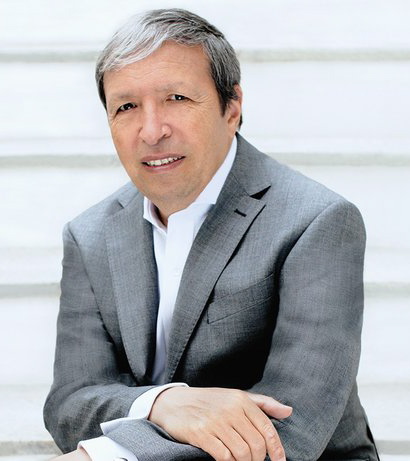Perahia returns with vital Bach and epic Beethoven
Murray Perahia returned to Symphony Center on Sunday with a program of three favored composers: Bach, Schubert and Beethoven (no Mozart or Brahms this time around).
It’s been over four decades since the American pianist won the Leeds Competition in 1972, and his acclaimed recordings of Mozart concertos–conducting the English Chamber Orchestra from the keyboard–cemented his international reputation. Perahia, who turned 70 last month, has dealt with injuries in recent years and there were a few isolated digital slips in the course of his recital. Yet for the most part, Perahia’s artistry, taste and insight remain as sterling as ever.
The first fruit of Perahia’s new Deutsche Grammophon contract was a disc of Bach’s French Suites and he opened the afternoon with No. 6 from that set. There is a relaxed vigor about Perahia’s Bach that feels just right, wedding vitality and humanity in graceful style on a modern Steinway.
And so it proved throughout BWV 817. Perahia invested the contrapuntal lines with bracing clarity, varying the dance rhythms with subtle dynamic and tempo fluctuations while staying within stylistic parameters. The opening Allemande went with a buoyant lilt, followed by a fleet, scintillating Courante, stately Sarabande and vivacious Polonaise. Perahia’s concluding Gigue was taken at a faster and more driven clip but rounded off the suite in exhilarating fashion.
Schubert’s second set of Four Impromptus, D935, works effectively as a stand-alone work (if not as an integral sonata as posited by Schumann). Perahia opened the thematically rich No. 1 in F minor in dramatic style, emphasizing the unsettled nature of the music, with his bold left hand keeping even the lyrical second theme firmly earthbound.
No. 2 in A flat provided fresh contrast with its rustic expression, though here too Perahia underlined the minor-key excursions of the middle section.
The third Impromptu in B flat was the finest of the set. Here the pianist brought out the lieder-like charm of the main theme, which highlighted the expressive contrasts of the ensuing variations from charming and elegant to darker, harmonically untethered regions. Perahia’s jumpy bravura in the closing Impromptu in F minor lent an edgy excitement with its minefield of virtuosic demands and runs up and down the keyboard.
Even in this age of supersonic piano phenoms, any performance of Beethoven’s “Hammerklavier” remains an event. By devoting the entire second half of his program to scaling Beethoven’s sonata Everest, Perahia seemed intent on showing that he had fully recovered from his injuries.
Here too there were fitful moments where the notes didn’t always land right. But the spirit and intellectual grasp of the music were there in abundance and consistently impressive.
Perahia is a different artist in the flesh than in his polished and thoughtful recordings, one more apt to throw caution to the winds. That was certainly the case in the opening Allegro where his unbridled attack on the main theme was strong and emphatic. Throughout Perahia balanced the material skillfully, showing architectural command and keeping keen momentum even if there were some muddled moments en route. The ensuing Scherzo maintained the nervous intensity.
In the epic Adagio, the pianist’s spare, searching performance explored the deep introspection while maintaining a restless undercurrent and achieving a sense of solace at the coda.
Perahia launched into the finale’s concluding fugue at a blistering pace and with the same sense of agitated virtuosity. While not note-perfect, the sense of titanic struggle and planets spinning was supremly conveyed as the pianist ratcheted up the speed with each successive technical challenge, culminating in a genuinely triumphant coda.
Vociferous cheers and extended applause brought Perahia out for repeated bows. The large crowd was clearly seeking an encore, but after the epic challenge of the Beethoven sonata, Perahia was finished for the afternoon. The pianist put his hand on his heart in grateful acknowledgment of the ovations and, understandably called it a day.
Posted in Performances





